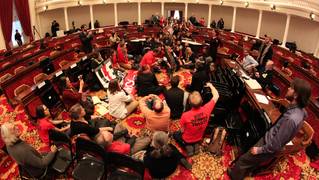
Guests
- Peter Sterlingexecutive director of Vermont Leads, an organization that advocates for single-payer healthcare in Vermont.
Links
In Vermont, incumbent Democratic Gov. Peter Shumlin has nearly been unseated in a shocking upset. In a process unique to Vermont, projections now show the governor’s race will be decided by the state Legislature after neither Shumlin nor his Republican challenger reached the necessary threshold of 50 percent. The state Legislature remains solidly Democratic, so Shumlin will likely keep his seat. But Shumlin was not considered a vulnerable candidate before last night, and Scott Milne, his challenger, was a relative unknown. The election is seen as a possible referendum on healthcare reform after Shumlin has vowed to make Vermont the first state with a single-payer healthcare system. The state’s embattled health insurance exchange implemented under Obamacare has been down since September. We are joined by Peter Sterling, executive director of Vermont Leads, an organization that advocates for single-payer healthcare in Vermont.
Transcript
AMY GOODMAN: And we’re going to stay there in Vermont, where the incumbent Democratic governor, Peter Shumlin, has nearly been unseated in a shocking upset. In a process unique to Vermont, projections now show the governor’s race will be decided by the state Legislature after neither Shumlin nor his Republican challenger, Scott Milne, reached the necessary threshold of 50 percent. In other states, it might be a runoff. In Vermont, the state Legislature will decide. It remains solidly Democratic, so Shumlin will likely keep his seat.
The election is seen as a possible referendum on healthcare reform, after Governor Shumlin has vowed to make Vermont the first state with a single-payer healthcare system. The state’s embattled health insurance exchange implemented under Obamacare has been down since September.
For more, we’re going to Peter Sterling, executive director of Vermont Leads, an organization that advocates for single-payer healthcare in Vermont. He’s in the nation’s—he’s in the state’s capital, Montpelier.
Welcome, Peter Sterling, to Democracy Now! We only have a minute before we go to Colorado, some other stunning results there. But talk about the significance of what’s taken place in Vermont.
PETER STERLING: Well, coming into this year, the governor seemed to have the wind at his back. Vermonters and polling really showed we wanted to move toward single-payer healthcare. And this election result does seem to take some of the wind away from Governor Shumlin and his plans, the centerpiece of his administration.
AMY GOODMAN: So, talk about—I mean, there’s two things that have gone on here. Vermont could be the first single-payer state, but you, unlike a number of states, have had a complete crisis with the Obamacare exchange, with the Vermont healthcare exchange. How did that happen? And even if Governor Shumlin has made the point that, you know, it’s complicated, and that’s why we need single payer—that’s a very fine distinction—people see that the government can’t run healthcare in Vermont. And will he be able to carry out this mandate if indeed the Legislature chooses him?
PETER STERLING: I mean, it’s a good point. And, I mean, we’re a small state. You’re largely going to see the same people who have been leading on the exchange lead on the movement to single-payer healthcare and to implementing it. But at the end of the day, the exchange is a problem with the website, which is on a very short timeline set up by the Affordable Care Act. We have many—a few years to do Green Mountain Care, so I think the governor can re-establish that confidence in his administration to implement up the nation’s first universal, publicly financed healthcare system.
AMY GOODMAN: And just the response—we have 20 seconds—to what has happened, that this race will be decided, as Peter Shumlin’s first governorship was decided, by the Vermont Legislature?
PETER STERLING: It’s certainly shocking to everyone here in the state that it was this close. But I would say that most voters did not go to the polls on a referendum on universal healthcare; they went there on property taxes and other local issues. So I’m not sure that the governor’s result was a referendum on the popularity of universal healthcare.
AMY GOODMAN: Peter Sterling, thanks for being with us, executive director of Vermont Leads, the organization that advocates for single-payer healthcare in Vermont.











Media Options